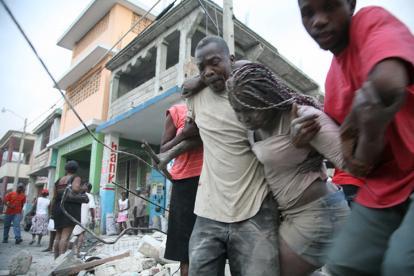 As the world has geared up to help a devastated Haiti, new challenges came into view. Destroyed ports, a crumbling airport and the lack of a local counterpart are hampering the international effort to help people still trapped under the rubble. Survivors, many of whom have no place to sleep, may have lost friends and family, and are now left to scavenge for food. President Obama has pledged $100 million and is dispatching 5,000 soldiers, as well as a hospital ship. Britain, China, France, Belgium and even debt-saddled Iceland have followed suit. But the scale of the disaster is frightening. When it becomes clearer how best to help, I will donate money; you should too.
As the world has geared up to help a devastated Haiti, new challenges came into view. Destroyed ports, a crumbling airport and the lack of a local counterpart are hampering the international effort to help people still trapped under the rubble. Survivors, many of whom have no place to sleep, may have lost friends and family, and are now left to scavenge for food. President Obama has pledged $100 million and is dispatching 5,000 soldiers, as well as a hospital ship. Britain, China, France, Belgium and even debt-saddled Iceland have followed suit. But the scale of the disaster is frightening. When it becomes clearer how best to help, I will donate money; you should too.
Even the most civilised society would struggle in those current conditions. In a country like Haiti, with its history of gangs, conflict and repression, a dog-eat-dog Hobbesian reality is all the more likely. Aid workers have already flagged the need for their make-shift distribution centres to be afforded greater protection.
What makes Haiti’s predicament all the more sad is that the Western Hemisphere’s poorest nation has actually had a few hopeful years. In early 2007 I was asked to go to Haiti to work on a US-funded programme, which sought to transform the gang-ridden slum of Cite Soleil. Three year before, the enclave rivalled Grozny and Kandahar as one of the world’s most dangerous and lawless places. Gangs had driven out the state, and used the region as a base from which to launch crime. The slum’s 300,000 inhabitants were trapped in a cycle of violence.
I never went, but I read-up on the country and its aid programmes and I remember thinking that Haiti’s dysfunction and lawlessness seemed almost immune to international assistance. Fortunately, I was wrong. Since 2007, Cite Soleil has improved. Its economy picked up, the state moved in, supported by the Brazilian-run UN mission and one of the most integrated, cross-government programmes the US has ever run. Poverty, weak institutions and crime remained, but friends and officials reports concur: things changed for the better. When food riots rocked Haiti in 2008, Cite Soleil stayed calm.
In the wake of the earthquake, the media is – quite rightly – focused on Haiti’s immediate problems and the country’s historical and geological misfortunate; but it is worth recalling the Haitians’ record of picking themselves up from the depths of despair. It is the kind of force that makes development work – when outside assistance is married to local will. And it is what will help this benighted country overcome its current predicament.






Comments